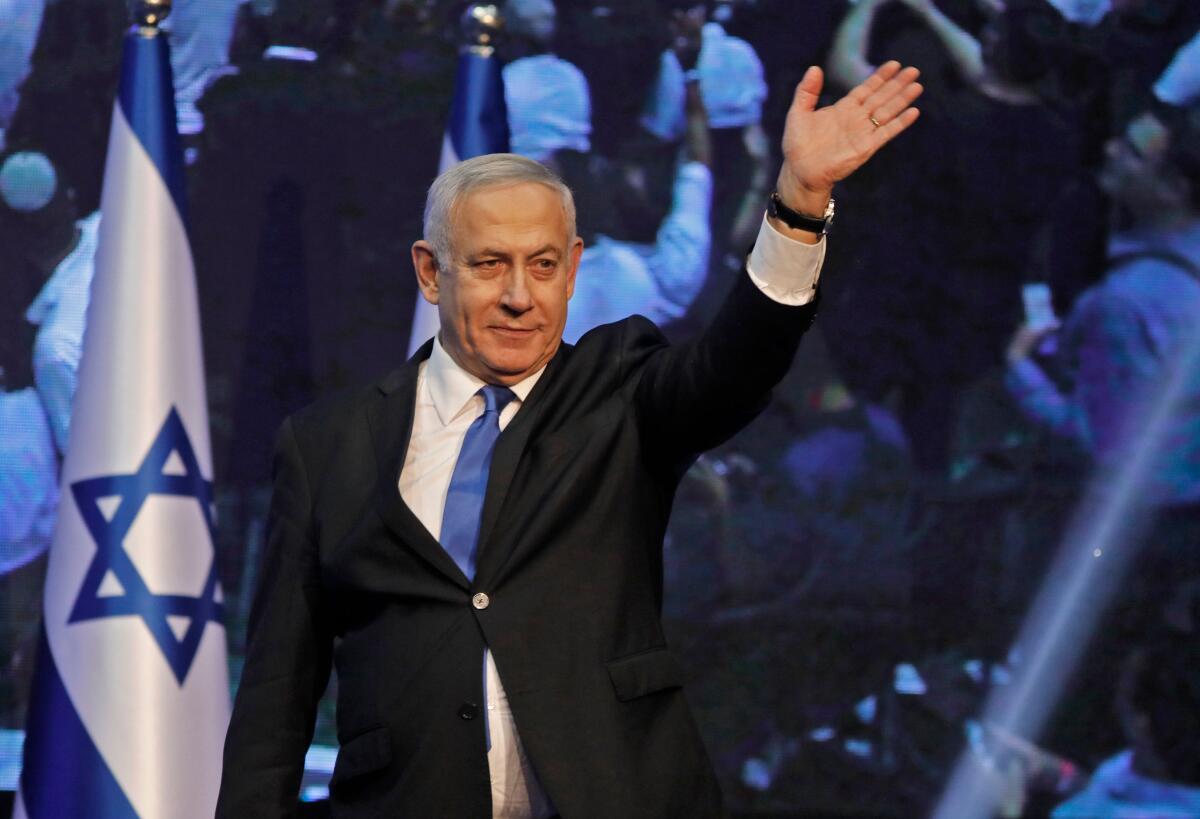Israel’s Netanyahu refrains from claiming victory as early count gives rival an edge

Israeli Prime Minister Benjamin Netanyahu, fighting for his political life, appeared to falter early Wednesday in his quest for a new term in office, with exit polls and early ballot-counting giving an edge to his main rival, former military chief Benny Gantz. In a wee-hours appearance, a somber Netanyahu pointedly refrained from claiming victory.
After a bruising and divisive campaign, Gantz’s centrist Blue and White party appeared to have won one or two more parliamentary seats than Netanyahu’s Likud. But the prime minister urged backers to wait for the complete tally.
For the record:
9:55 a.m. Sept. 18, 2019An earlier version of this article incorrectly referred to “Palestinian territory” in the Jordan Valley. The land in question was seized from Jordan in 1967 and has been occupied by Israel. Palestinians want it as part of a future state.
“We are still waiting for the final results, but one thing is clear: The state of Israel is at a historical point of time,” Netanyahu said to scattered cheers at his party’s headquarters.
It was after 3 a.m. when the prime minister appeared onstage, sounding hoarse and looking fatigued. He called the campaign “most difficult … difficult is not quite the word.”
Instead of a victory claim, Netanyahu hailed his own achievements, railed against the “very slanted” media, and slammed the Arab-majority party that appeared to have surged in the vote.
Gantz, speaking to his own supporters, also urged awaiting final results, but — sounding like the military man he was for so long — said Netanyahu had “failed in his mission.”
“This is the start of a journey to repair Israeli society,” he said.
Counting votes is a laborious process in Israel. There is no electronic voting, and paper ballots are counted by hand, one by one, with observers of each political party observing. The final count is unlikely to be certified for several days.
But it was clear that no party garnered a majority in the 120-seat Knesset, meaning the winning party will have to find allies in order to form a coalition.
Early tallies suggested that Netanyahu’s ally-turned-rival Avigdor Lieberman had strengthened his party’s hand, crucially positioning him as a kingmaker in coming coalition negotiations. And a faction mainly representing Arab citizens of Israel appeared on track to become the third-largest party, drawing an infuriated admonition from Netanyahu not to empower it by bringing it into a governing coalition.
“It is not possible to have a government dependent on Arab parties who support terror and don’t support the existence of Israel as a Jewish state,” he said. “The order of the hour is to prevent the establishment of an anti-Zionist government.”
Netanyahu, 69, has more at stake than extending his run as the country’s longest-serving prime minister. Victory could give him the means to fend off likely criminal corruption charges. The prime minister frantically campaigned throughout the day of voting, at times in defiance of election rules, taking to social media and even hefting a bullhorn in Jerusalem’s central bus station.
A loss for Netanyahu would amount to a political earthquake in Israel. A consummate political survivor, the prime minister is nicknamed “the magician,” in part for his ability to stage miraculous escapes from difficult situations. But the exit polls were sobering.
“The results don’t look good right now, but we hope they will improve as the actual votes are counted,” Yoav Kish, a Likud member of the Knesset, said after seeing the early tallies.
At the campaign headquarters of Likud, the atmosphere darkened in the early morning hours as initial ballot counts pointed to gains by Blue and White and its prospective coalition partners. Before a sparse audience, a reel of Netanyahu media appearances played on a big screen.
It was the second national election in five months. In April, Likud beat Blue and White by the slightest of margins, but Netanyahu failed to recruit enough allies to form a coalition. Tuesday’s turnout of nearly 70% was about 2.5% higher than in the last balloting, which saw historically low numbers of voters.
Coalition politicking will be the key thing to watch after the votes are counted. It’s even possible that Likud and Blue and White, despite their differences, would agree to join forces in a “unity” government — although Gantz says he will not sit in government with the prime minister if he is indicted, and Likud is unlikely to jettison Netanyahu as its leader.
Or there could be another stalemate, which could conceivably lead to yet another national vote, probably early next year.
Netanyahu has been shadowed by separate but intertwined long-running scandals, and the attorney general has recommended criminal charges in three of them. He faces accusations of accepting expensive gifts for political favors, ordering government action aimed at hurting a newspaper in exchange for favorable coverage from a competitor, and helping a friend receive regulatory concessions for his telecommunications company.
The prime minister denies all the allegations against him.
With an indictment expected pending a hearing in two weeks, some hard-line and ultra-religious potential coalition partners are willing to support measures that would grant Netanyahu immunity from prosecution while in office. But that would all but rule out an alliance with the secular Lieberman. But at least one of those prospective partners didn’t get enough votes to make it into the Knesset.
Even if he were asked by President Reuven Rivlin to try to form a coalition, Netanyahu — who has been prime minister for the last decade and also served for several years during the 1990s — would again face difficult arithmetic. Rivlin is to consult with all the party leaders in the next few days.
A complicating factor for the prime minister is Lieberman, whose party, Yisrael Beiteinu — Israel Is Our Home — appeared to emerge as among the night’s big winners.
Lieberman refused after the April vote to enter into a coalition with Netanyahu unless the prime minister agreed to a new military draft law for ultra-Orthodox Jewish seminarians. Their exemptions are a sore point with many secular Israelis.
Speaking to cheering backers in Jerusalem, Lieberman expressed hopes for a “unity government with Gantz and Likud.”
In the weeks, days and hours leading up to the election, as well as on voting day, the prime minister stayed with his usual political playbook and took dramatic steps to appeal to Israel’s far right. Last week he pledged to annex the Jordan Valley, which makes up a large part of the West Bank.
Seizing so much territory would probably be a death knell for the so-called two-state solution, which calls for Israel and a Palestinian state to exist side by side.
But for many Israeli voters, bread-and-butter domestic issues are far more important.
Netanyahu, as in the past, has also been criticized for harsh anti-Arab rhetoric leading up to the vote, which might have helped to galvanize the Israeli citizens of Palestinian descent who make up about a fifth of the electorate. The principal Arab-majority party, the Joint List, performed strongly, according to exit polls, possibly doubling its seats.
The Arab faction’s gains threaten Netanyahu, whose tenure those parliamentarians would like to end. With the Joint List projected to become the third-largest party in parliament, Netanyahu’s furious attacks on Arab politicians may have backfired. The faction’s leader Ayman Odeh told Israel’s Channel 13 that “there’s a heavy price to pay for incitement.”
Like his ally President Trump, Netanyahu has targeted the news media in the election run-up and launched stinging personal attacks on political foes, as well as law enforcement and the judiciary.
He has sought to depict himself as a master statesman, continually touting his warm relationship with Trump but also reaching out to leaders like Russian President Vladimir Putin, with whom he met last week. As Tuesday’s vote was going on, Russia announced Putin would visit Israel in January.
Before the April vote, Trump moved to bolster Netanyahu’s prospects, recognizing Israeli sovereignty over the disputed Golan Heights, which Israel captured from Syria in 1967. But the Israeli government was dismayed by Trump’s recent firing of John Bolton, the hawkish national security advisor whose views on Iran aligned closely with Netanyahu’s.
Voting results will color reception of the long-delayed peace plan being put together by Trump’s son-in-law and advisor, Jared Kushner. If Netanyahu triumphs and is able to form a hard-right government, he would have a difficult time getting his allies to make any concessions to the Palestinians, which could torpedo the plan. But Gantz has expressed more willingness to negotiate with the Palestinians.
Special correspondent Tarnopolsky reported from Tel Aviv and Times staff writer King from Washington.
More to Read
Start your day right
Sign up for Essential California for news, features and recommendations from the L.A. Times and beyond in your inbox six days a week.
You may occasionally receive promotional content from the Los Angeles Times.






